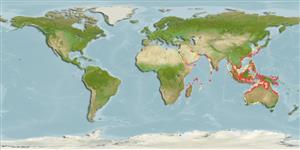Preferred temperature (Ref.
115969): 25 - 29.1, mean 28.3 (based on 798 cells).
Phylogenetic diversity index (Ref.
82804): PD
50 = 0.7500 [Uniqueness, from 0.5 = low to 2.0 = high].
Bayesian length-weight: a=0.00851 (0.00777 - 0.00932), b=3.07 (3.05 - 3.09), in cm Total Length, based on LWR estimates for this species (Ref.
93245).
Nivel trófico (Ref.
69278): 3.6 ±0.6 se; based on diet studies.
Resiliencia (Ref.
120179): Medio, población duplicada en un tiempo mínimo de 1.4-4.4 años (K=0.14-0.41; tm=1; tmax=5; Fec= 53,676).
Prior r = 0.44, 95% CL = 0.29 - 0.66, Based on 1 full stock assessment.
Fishing Vulnerability (Ref.
59153): Moderate vulnerability (39 of 100).
Climate Vulnerability (Ref.
125649): Very high vulnerability (84 of 100).
